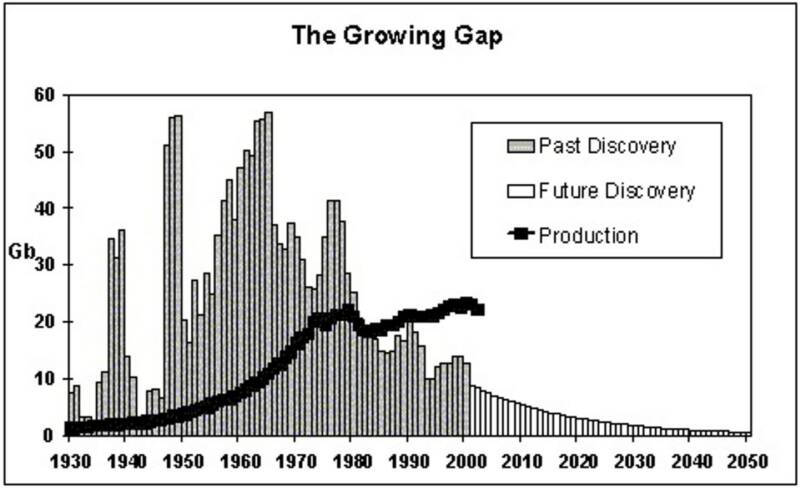No, this isn’t one of the many religious end-of-the-world warnings based on dusty books or personal revelations. It’s much worse. It is the story of “peak oil,” based on the sort of evidence that leaves both disciplined scientists and conservative bankers tossing in their sleep.
Exhibit A is the refusal of oil companies to build any additional refineries. They won’t build them anymore because refineries won’t be needed, even as demand for oil is relentlessly soaring. Why won’t refineries be needed? Because there won’t be any new oil to refine.
The story of “peak oil” is so huge and horrifying that the American public probably couldn’t bear to hear about it, even if the national media bothered to cover the issue. Of course, the American media is still too busy telling us about Janet Jackson’s nipple, Aruba murders and teachers having sex. If you want to be truly informed–if you want to be the person who destroys the mood at the next party you attend, read the next few paragraphs.
Here’s the problem in a simple picture representing the discovery and production of oil over time:

Matt Savinar is a California attorney who has worked incessantly to spread the word about global “Peak Oil.” A visit to his detailed and sober website is like a brutal kick in the stomach. It leaves one wondering who is going to take care of all of us and how “they” are going to do it. No such luck, according to Savinar. We’re all headed toward the “post-industrial stone age.” All you can do is disgorge yourself of all those retirement plans, for a simply reason. Everything is oil. Houses are warmed and people are able to get across town with oil. Food is fertilized and transported with oil (the average piece of food travels more than 1,000 miles before landing on your plate). The world is simply not going to be the way you previously imagined.
What, exactly, will happen? According to Savinar, “If you are focusing solely on the price at the pump, more fuel-efficient forms of transportation, or alternative sources of energy, you aren’t seeing the bigger picture.” In Savinar’s words:
worldwide demand for oil will outpace worldwide production of oil by a significant margin. As a result, the price will skyrocket, oil-dependant economies will crumble, and resource wars will explode
Note: Peak Oil is an entirely different issue than the horrifying onslaught of global warming. Even if there were a solution to peak oil, it would not change the fact that 98 percent of the world’s mountain glaciers are melting or that melting polar caps will push sea levels three feet higher all around the world within 100 years.
Perhaps this story about peak oil now has your attention and you think this it’s awful news. Perhaps you’re wondering how many more decades do we have until “peak oil,” that point at oil production actually begins its decline?
The answer is zero according to Savinar. Oil production peaked in 2000. By 2020, the decline will be noticable. As the production of oil now starts to slide, it will trigger massive spikes in energy prices (during the 1970s oil shocks, shortfalls in production as small as 5% caused the price of oil to nearly quadruple).
For a more detailed overview, see Savinar’s site and check out his many references. Also see the recent article on Savinar at Salon.com and James Howard Kunstler’s 2005 book: The Long Emergency.


"It was an incredible revelation last week that the second largest oil field in the world is exhausted and past its peak output. Yet that is what the Kuwait Oil Company revealed about its Burgan field." See http://www.kuwaittimes.net/localnews.asp?dismode=…
Here is a thorough non-doomsday report on peak oil by Omninerd.
Click here for the Omninerd.
Another site that has been well-recommended by others on this issue is R-Squared Energy Blog.
At a press briefing last week, members of the Congressional Peak Oil Caucus criticized a recent report from the National Petroleum Council (NPC) for obscuring the truth about peak oil. Tom Udall (D-New Mexico) accused the NPC of fostering "a false sense of complacency" about oil supplies. He contrasted the NPC report with one from the International Energy Agency that was released at about the same time. That report, Udall said, sounded a "clarion call" and "said what needs to be said, that we're probably going to peak in the next couple of years. This could cause some very severe economic consequences and the world needs to start organizing and dealing with this."
http://www.truthout.org/docs_2006/080207J.shtml
Here's a site that lists numerous other websites that seriously address the issue of peak oil. http://www.saveandconserve.com/2006/12/top_25_pea…